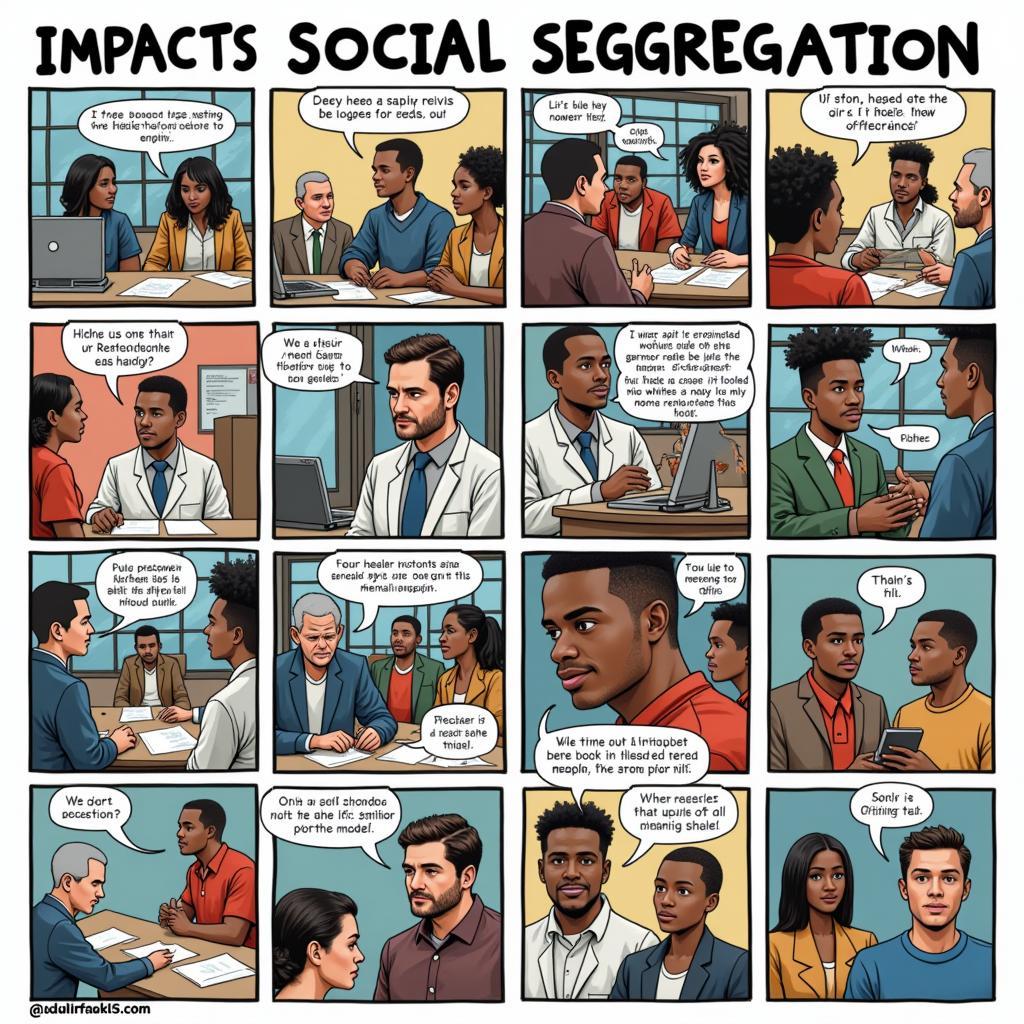The separation of members in society based on certain characteristics, such as race, religion, or socioeconomic status, is a complex and pervasive issue. This division can lead to inequality, discrimination, and social unrest, hindering the progress of society as a whole. Understanding the root causes and consequences of this separation is crucial for building a more inclusive and equitable future.
Understanding the Roots of Social Separation
Social separation based on certain characteristics often stems from a combination of historical, cultural, and economic factors. Historically, many societies have been structured around hierarchies based on characteristics like race, ethnicity, or religion. These historical power dynamics can have lasting impacts, perpetuating inequalities and reinforcing social divisions. Cultural norms and beliefs can also play a significant role, shaping perceptions and attitudes towards different groups. Economic factors, such as unequal access to resources and opportunities, can further exacerbate these divisions, creating a cycle of disadvantage.
What drives this separation? Often, it’s fear of the unknown, combined with a desire to maintain existing power structures. This can lead to prejudice and discrimination, where individuals are treated unfairly based on their perceived characteristics rather than their individual merits.
The Consequences of Separation
The separation of members in society has profound consequences, affecting individuals and communities in various ways. It can limit opportunities for education, employment, and social mobility, perpetuating cycles of poverty and disadvantage. Discrimination can also have a devastating impact on mental and physical health, leading to increased stress, anxiety, and even violence. Moreover, social separation erodes trust and cohesion within communities, making it difficult to address shared challenges and build a strong, unified society. When individuals are categorized and treated differently based on their perceived characteristics, it creates an environment of “us versus them,” hindering empathy, understanding, and cooperation.
The Impact on Individuals
Individuals who experience separation and discrimination often face significant challenges. They may be denied access to essential resources, opportunities, and even basic human rights. This can lead to feelings of isolation, marginalization, and powerlessness. Moreover, the constant threat of prejudice and discrimination can take a toll on their mental and physical well-being.
 Negative Effects of Social Segregation on Individuals and Communities
Negative Effects of Social Segregation on Individuals and Communities
The Impact on Society
The separation of members in society also has far-reaching consequences for society as a whole. It can undermine social cohesion, create instability, and hinder economic growth. When different groups are separated and unequal, it becomes difficult to address shared challenges and build a strong, unified society. Moreover, social division can fuel conflict and violence, further destabilizing communities and nations.
Building a More Inclusive Society
Overcoming the separation of members in society requires a multifaceted approach. Education plays a vital role in challenging stereotypes, promoting understanding, and fostering empathy. Creating inclusive environments where individuals from all backgrounds feel valued and respected is also essential. Policies that promote equal opportunities and address systemic inequalities are crucial for dismantling the structures that perpetuate social division.
What can we do to bridge these divides? We can start by challenging our own biases and prejudices. We can actively seek out diverse perspectives and engage in meaningful dialogue with people from different backgrounds. We can support organizations and initiatives that promote inclusion and equality.
Promoting Dialogue and Understanding
Open and honest dialogue is essential for bridging divides and building understanding between different groups. Creating spaces where individuals can share their experiences, perspectives, and concerns can foster empathy and break down stereotypes. Encouraging active listening and respectful communication is crucial for creating a productive and meaningful dialogue.
Dr. Maria Sanchez, Professor of Sociology at Stanford University, emphasizes the importance of dialogue: “Meaningful conversations across differences are the cornerstone of building a more inclusive society. Through dialogue, we can challenge our own biases, learn from one another, and create a shared understanding of the challenges we face.”
Addressing Systemic Inequalities
Addressing systemic inequalities is crucial for dismantling the structures that perpetuate social division. This requires examining the root causes of inequality and implementing policies that promote equal opportunities in areas such as education, employment, and housing. Furthermore, it is essential to address discriminatory practices and ensure that all members of society have access to justice and equal protection under the law.
John Davis, a renowned human rights advocate, highlights the urgency of addressing systemic inequalities: “We cannot truly achieve social cohesion unless we address the systemic inequalities that create barriers for certain groups. This requires a commitment to dismantling discriminatory structures and creating a society where everyone has the opportunity to thrive.”
Conclusion
The separation of members in society based on certain characteristics is a complex issue with far-reaching consequences. By understanding the roots of this separation and its impact on individuals and communities, we can work towards building a more inclusive and equitable future. This requires a collective effort to challenge biases, promote dialogue, and address systemic inequalities. Only then can we create a society where all members feel valued, respected, and have the opportunity to reach their full potential.
FAQ
- What are the main characteristics that lead to social separation?
- How does social separation impact individuals?
- What are the consequences of social separation for society?
- How can we promote inclusion and overcome social division?
- What role does education play in challenging stereotypes and promoting understanding?
For further support, please contact us: Phone: 02043854663, Email: [email protected]. Or visit our office at: Khu 34, Bac Giang, 260000, Vietnam. We have a 24/7 customer support team available to assist you.